A clogged drain can disrupt your daily routine and lead to costly repairs. By identifying the common causes of drain clogs, you can take proactive measures to prevent them and keep yours flowing smoothly.
From hair and grease buildup to foreign objects and tree roots, we will discuss the various contributing factors and provide practical solutions to avoid them.
Table of Contents
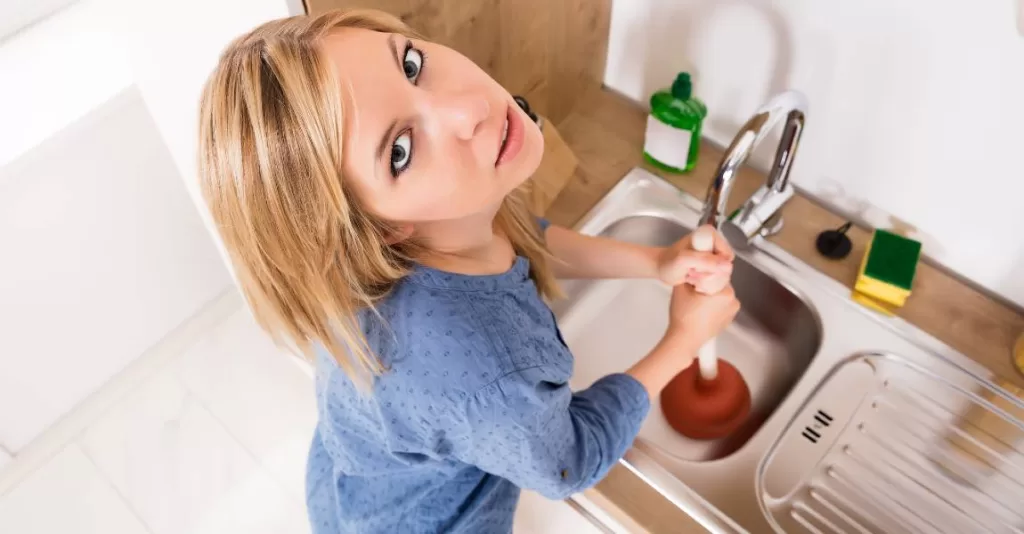
What is a Drain Clogs?
A drain clog occurs when materials or substances obstruct water flow through a plumbing system, leading to slow drainage or complete blockage.
Common causes of drain clogs include hair and fur, food scraps, FOG (fats, oils, and grease), mineral buildup, and paper products. Hair and fur can get tangled and accumulate in drains, while food scraps, FOG, and mineral buildup can solidify and stick to the walls of pipes, causing blockages. Paper products, such as paper towels and wet wipes, can also contribute to clogs by not breaking down properly and accumulating in the pipes.
To prevent clogged drains, it is important to dispose of food scraps properly and FOG in the trash, use strainers to catch hair and debris, and avoid flushing paper products down the toilet. Regularly using a drain cleaner or having a professional clean your clogged drains can also help prevent clogs.
Common household items that contribute to drain clogs include cooking oils, soap scum, and toilet paper. It is important to seek professional help cleaning up tough clogs to ensure the plumbing system is not damaged. Professional plumbers have the tools and expertise to remove clogs and restore proper drainage effectively.
What are 9 Common Causes of Drain Clogs?
When dealing with clogged drains, it’s essential to understand the common culprits that can lead to this issue. Various factors can contribute to a clog, whether in kitchen sinks, bathtub drains, shower drains, or clogged pipes. Identifying these common causes is essential for preventing future blockages and maintaining a smooth-flowing drainage system.
Understanding the 9 common causes of drain clogs can help you address these issues effectively and keep your plumbing in top condition.
Food Waste
Disposing food waste properly is essential to prevent clogs and keep your kitchen sink running smoothly. Start by using a filter or drain guard in the sink to catch small food particles.
When you’re done washing dishes or preparing food, make sure to scrape any food scraps into the trash can instead of rinsing them down the drain. This includes potato peels, fruit peels, and other food waste.
Do not pour fatty foods or oils; they can solidify and cause clogs.
If you have a garbage disposal unit, you can only use it for small food scraps, and make sure to run plenty of water while it’s in use to help flush the waste through the pipes.
Consider using an eco-friendly drain cleaner regularly to prevent any build-up. This can help break down any grease or food particles that may be clinging to the pipes and reduce the risk of clogged kitchen sinks.
Taking these simple steps to dispose of food waste properly, you can help maintain a clean and functional kitchen sink.
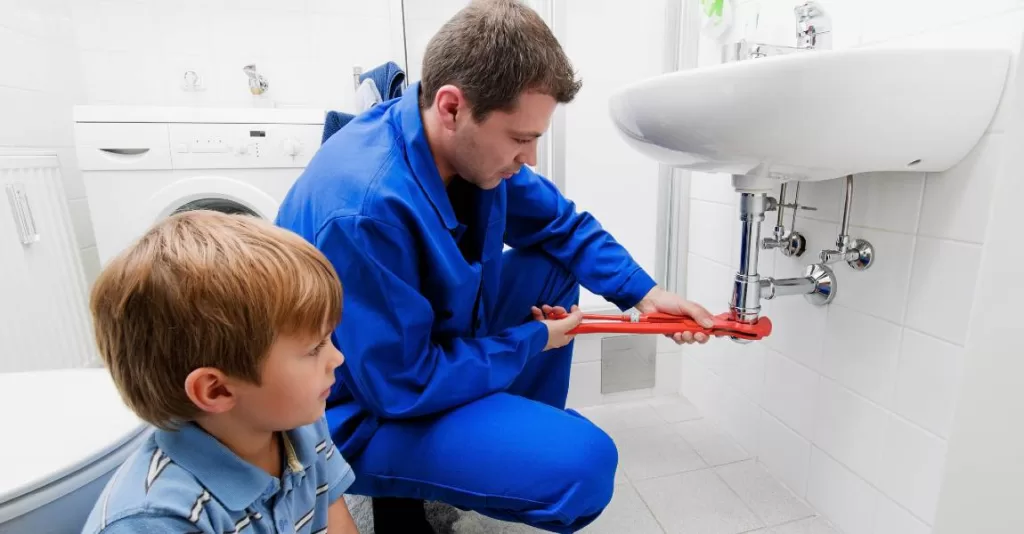
Hair
To effectively prevent hair from causing clogs; it’s important to use a combination of preventative measures.
- Regularly clean your drains with chemical cleaners to break down any buildup of hair and other debris that may be causing drainage issues.
- Use hair traps and strainers in your drains to catch hair before it enters the plumbing system.
- Installing double sinks in the bathroom can also help prevent clogs by allowing for better water flow and reducing the likelihood of hair buildup.
In addition to these measures, you could consider using a drain cover to catch excess hair. This simple tool can be easily installed and will help to prevent pet hair and other debris from causing clogs.
By implementing these strategies, you can effectively prevent hair from causing any clogs and avoid the hassle of dealing with costly repairs and inconvenient plumbing issues.
Soap Scum and Residue
To address soap scum and residue build-up in your pipes, using liquid soaps can help prevent the accumulation of soap scum.
Regularly cleaning your drains with a cleaner specifically designed to break down soap residue can also prevent clogs in bathroom drains.
When it comes to bar soaps and toothpaste, the potential risks of using these products include contributing to clogs and film build-up in pipes.
Bar soaps contain fats and oils that can solidify and create pipe blockages over time.
Toothpaste can also leave behind a film that can lead to build-up and clogs in drains.
To rinse down toothpaste and prevent film build-up, it is important to run hot water after using toothpaste to help break down any residue.
Using a chemical drain cleaner regularly can help prevent film build-up and keep your pipes clear.
Using liquid soaps and regularly cleaning your drains can help address soap scum and residue buildup inside pipes while being mindful of the potential risks of using bar soaps and toothpaste can help prevent clogs and film buildup inside pipes.
(F.O.G.) Grease and Oil
Disposing grease and oil is crucial in preventing clogged drains and plumbing issues.
Avoid pouring oil or fat directly down the drain, as it can solidify and cause a major clog. This includes cooking grease from frying or bacon grease. Instead, let the grease or oil cool and then transfer it into an airtight container for disposal.
Alternatively, you can take it to a recycling center that accepts used cooking oil. It’s important to understand the potential consequences of pouring grease and oil down the drain, such as the need for commercial cleaners or even professional plumbing services.
Using a garbage disposal does not necessarily make it safe to pour grease or oil down the drain, as it can still lead to buildup and clogs.
Proper disposal of fatty substances will help to keep your drains and plumbing functioning smoothly and can prevent costly repairs in the future.
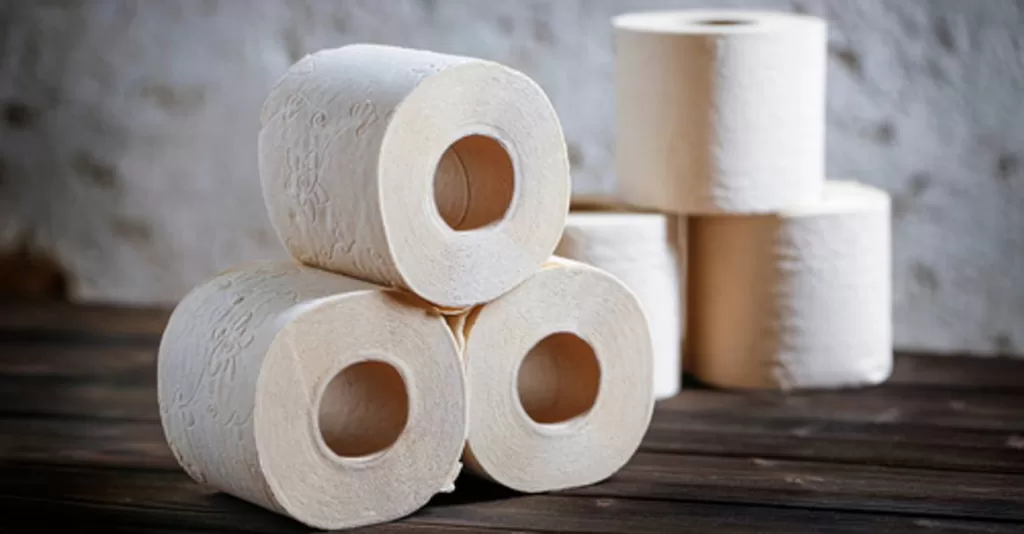
Excess Toilet Paper
If not addressed properly, excess toilet paper can lead to sewage backups and septic tank issue. To prevent this, it’s important to use only the recommended amount of toilet paper when using it. This helps avoid excess buildup in the sewage system and ensures that it can be flushed thoroughly without causing stubborn clogs.
When using toilet paper, make sure to flush it thoroughly to prevent any buildup in the pipes. It’s important to note that items such as flushable wipes, feminine hygiene products, and dental floss should never be flushed, as they can cause blockages and backups.
Consider using biodegradable toilet paper to further minimize the impact on sewage systems and septic tanks.
Being mindful of the amounts of toilet paper being used can greatly reduce the risk of plumbing issues.
In the event of a clog, a toilet plunger can often resolve the issue without the need for professional intervention.
Following these simple guidelines can help prevent sewage backups and septic tank problems caused by excess toilet paper.
Feminine products and cotton swabs
Regarding proper disposal, never flush feminine products and cotton swabs down the toilet is essential. Due to their absorbent nature, they have the potential to clog drains and cause plumbing issues.
To avoid nasty clogs and the need for professional drain cleaning services, it is necessary to discard these items in the garbage. This simple preventative measure can help keep your bathroom toilet and plumbing system functioning properly.
Remember, sanitary products and cotton swabs should never be flushed as they can cause costly and inconvenient plumbing problems. Always dispose of these items in the household trash to ensure they do not wreak havoc on your plumbing system.
Wipes
Proper disposal methods for various types of wipes include throwing baby wipes, flushable wipes, makeup wipes, and cleaning wipes in the trash. It is important never to flush wipes down the toilet, even if they are labeled as “flushable,” as they do not break down like toilet paper.
Flushing wipes can clog pipes, damage sewer lines, and cause costly backups. This can lead to sewage spills, environmental damage, and costly repairs.
The potential consequences of flushing wipes include clogging and blockages in drain pipes and sewer lines, which can lead to raw sewage backing up into homes and businesses, creating health hazards and property damage.
Flushing wipes can also impact water treatment centers by clogging filters and creating extra processing costs.
To prevent these consequences, it is crucial to dispose of wipes in the trash, along with other paper products and cotton swabs.
Proper disposal of wipes can help protect our water systems and prevent costly and damaging sewage backups.
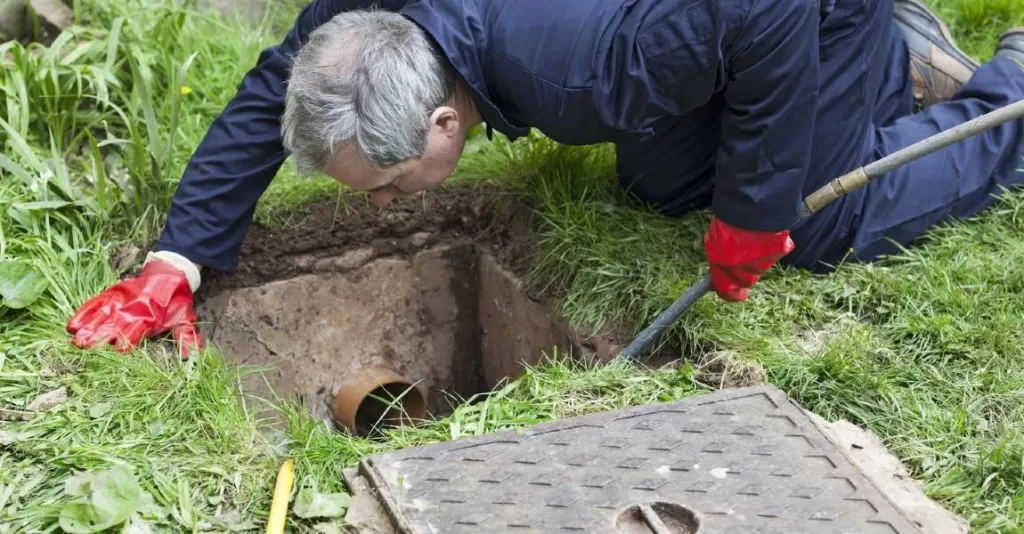
Tree Roots
Tree roots can be incredibly invasive, especially regarding sewer and water lines in your home. If your property has large trees nearby, it is crucial to regularly inspect and address any potential tree root invasion in these pipes to prevent costly damage.
Tree roots growing within sewer and water lines can cause various issues, including blockages, cracks, and even complete pipe failure.
Signs of tree root invasion to look out for include:
- slow drainage
- gurgling noises
- foul odors
- sewage backups
- standing water around the area of your sewer line
Consider having a video inspection every few years to prevent these costly issues. This will allow licensed plumbers to use specialized tools to inspect the inside of your pipes for any signs of invasive tree roots.
If tree root invasion is detected, they can assist with repairs before the issue becomes more severe and expensive to fix.
Regular inspection and addressing tree root invasion are crucial for maintaining the integrity of your sewer and water lines, especially in properties with large trees nearby. Be proactive in preventing potential damage and expensive repairs.
Mineral Buildup
Mineral buildup in pipes can be a common issue, particularly in areas with hard water. To remove mineral buildup, hydro jetting can be an effective method. This involves using high-pressure water to break up and flush out the mineral deposits from the pipes.
Installing a water softener system can help prevent future hard water issues, as it works to reduce the mineral content in the water.
There are also DIY options to help remove mineral deposits. A mixture of hot water, baking soda, and vinegar can be poured down the affected drains to help dissolve and dislodge the minerals.
By using a water softener, homeowners can proactively reduce water hardness and prevent mineral buildup in their pipes. This can lead to improved water flow, reduced plumbing issues, and longer-lasting appliances and fixtures.
Taking proactive measures such as hydro-jetting and installing a water softener can help prevent mineral buildup and keep plumbing systems running smoothly. If the problem persists, it is best to consult a plumber for drain cleaning to alleviate slow-running drains and prevent further damage.
Clogged Drains Prevention Tips
Clogged drains can be a common and frustrating issue that often leads to costly repairs. With some simple preventative measures, you can avoid this problem altogether.
Following these clogged drains prevention tips can keep your drains clear and functioning properly, saving time and money.
Drain Cleaning Regularly
Regular drain cleaning service is essential for maintaining the optimal function of your plumbing system. It helps prevent clogs and extends the lifespan of your pipes, saving you from costly repairs and replacements. Simple tools like a plunger or a plumber’s snake can be used for regular drain cleaning, allowing you to address minor clogs and keep your drains flowing smoothly and quickly.
The benefits of regular drain cleaning are vast. It reduces the risk of blockages and backups, ensuring water and waste flow freely through your pipes. This helps to maintain optimal function and prevents unpleasant odors and potential water damage in your home.
Professional drain cleaning services can also thoroughly clean and inspect your drains, ensuring that any potential issues are addressed before they escalate into major problems.
Regular drain cleaning, whether done with simple tools or by a friendly drain cleaner, is an important part of home maintenance that can save you time, money, and stress in the long run.
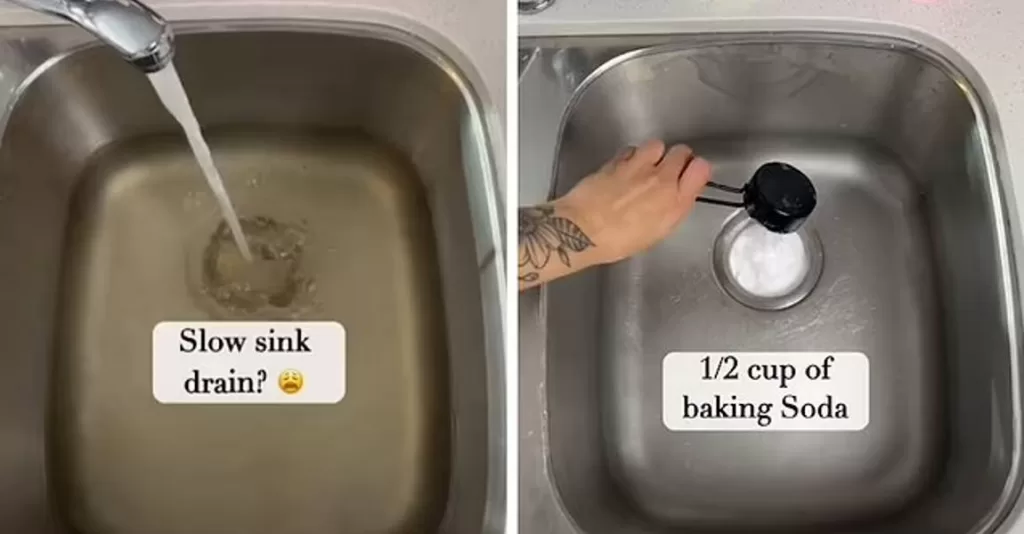
Use of Baking Soda and Vinegar
Baking soda and vinegar are versatile household items that can be used for various cleaning and maintenance tasks.
Unclogging Drains:
1. Pour 1/2 cup of baking soda down the drain.
2. Follow with 1/2 cup of vinegar.
3. Let the mixture fizz for a few minutes.
4. Flush with hot water.
Removing Odors:
1. Place an open box of baking soda in the fridge to absorb odors.
2. Sprinkle baking soda on carpets and upholstery, let it sit for 15 minutes, then vacuum.
Cleaning Surfaces:
1. Create a paste with baking soda and water to scrub sinks, countertops, and appliances.
2. Use a mixture of equal parts water and vinegar to clean windows, mirrors, and other glass surfaces.
Safety precautions:
- Do not mix baking soda and vinegar in a closed container, as the reaction can cause pressure to build up.
- Always test a small, inconspicuous area before using baking soda and vinegar on surfaces to ensure it won’t cause damage.
Baking soda and vinegar are affordable, eco-friendly alternatives to harsh chemicals for various household cleaning tasks.
Avoid Chemical Drain Cleaners
Chemical drain cleaners are known to have harmful effects on both the environment and human health. These cleaners often contain corrosive chemicals such as lye or sulfuric acid, which can cause burns, respiratory issues, and even be fatal if ingested.
The frequent use of chemical drain cleaners can deteriorate pipes and lead to costly repairs or replacements.
- Safer alternatives to chemical cleaners include natural ingredients such as hot water, baking soda, and vinegar. Baking soda and vinegar can be combined to create a foaming reaction that helps break down clogs, while hot water can be used to flush them away.
- Another option is using a plunger or a plumbing snake to remove the clog physically. These natural methods are safer for the environment and health and effective in clearing most clogs.
Frequent use of chemical cleaners can lead to potential damage to both your pipes and your health. By opting for natural ingredients and safer alternatives, you can effectively clear clogs while avoiding the harmful effects of harsh cleaners on the environment and your well-being.
Conclusion
Regular maintenance with a professional plumber is crucial in preventing clogs.
Common causes of clogs include hair, grease, food waste, and mineral build-up. Without regular maintenance, these substances can accumulate over time and lead to blockages in your pipes. A professional plumber can inspect your plumbing system, identify potential issues and provide preventive measures.
Preventive measures may include regular drain cleaning, using strainers to catch debris and properly disposing of fats, oils, and greases. By taking proactive steps and scheduling regular maintenance with a professional plumber, you can avoid the inconvenience and expense of dealing with severe clogs in the future.
At JD’s Plumbing, Heating, and Air Conditioning, our experienced plumbers can help you maintain your drains and prevent clogs. Don’t wait until a clog causes a major plumbing issue. Call us today to schedule regular maintenance and keep your system running smoothly. With our expertise and preventive measures, you can ensure a clog-free plumbing system for years to come.





